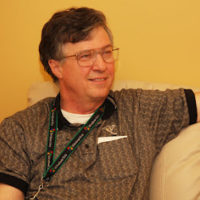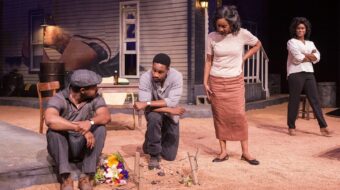
Philip Levine has just completed his year-long term as the U.S. poet laureate. At 85 years old he is not the oldest poet to hold the position (That honor belongs to Stanley Kunitz).
He is not the most educated. He is certainly not rich.
Phil was Detroit-made, through and through: “a deuce and a quarter, babe, with enough chrome to reflect the moon from sea to shining sea.”
John Hiatt turned his verse to roots rock.
His poems smell like gasoline, machine shops, foundries, assembly lines, and the neighborhoods take care of each other;
where it’s late but everything comes next; where you take a nap after your shift even before your shower;
where rats are always hungry, and the wolverines find boundless devotion;
where the working class line forms apart from the boss class line, and there’s not much else in between.
Richard Trumka threw a party for him last fall. Levine is no friend of the labor-despisers, race-baiters and war-hogs.
A poet laureate whose position, as the AFL-CIO noted, gave nationwide attention to a plain and outspoken affinity with working people …
whose signature poetry collection is “What Work Is.
Let him tell it in his own words:
“The Simple Truth”
I bought a dollar and a half’s worth of small red potatoes,
took them home, boiled them in their jackets
and ate them for dinner with a little butter and salt.
Then I walked through the dried fields
on the edge of town. In middle June the light
hung on in the dark furrows at my feet,
and in the mountain oaks overhead the birds
were gathering for the night, the jays and mockers
squawking back and forth, the finches still darting
into the dusty light. The woman who sold me
the potatoes was from Poland; she was someone
out of my childhood in a pink spangled sweater and sunglasses
praising the perfection of all her fruits and vegetables
at the road-side stand and urging me to taste
even the pale, raw sweet corn trucked all the way,
she swore, from New Jersey. “Eat, eat” she said,
“Even if you don’t I’ll say you did.”
Some things
you know all your life. They are so simple and true
they must be said without elegance, meter and rhyme,
they must be laid on the table beside the salt shaker,
the glass of water, the absence of light gathering
in the shadows of picture frames, they must be
naked and alone, they must stand for themselves.
My friend Henri and I arrived at this together in 1965
before I went away, before he began to kill himself,
and the two of us to betray our love. Can you taste
what I’m saying? It is onions or potatoes, a pinch
of simple salt, the wealth of melting butter, it is obvious,
it stays in the back of your throat like a truth
you never uttered because the time was always wrong,
it stays there for the rest of your life, unspoken,
made of that dirt we call earth, the metal we call salt,
in a form we have no words for, and you live on it.
As with his poetry, in which the workers who fill his poems carry with them the hope and perseverance that belies their often brutal environments, there is one constant that carries him through: I do believe in people.
Poem reprinted with permission. Photo: Philip Levine reading his poems in New York City, September 2006. David Shankbone Creative Commons 2.5












Comments